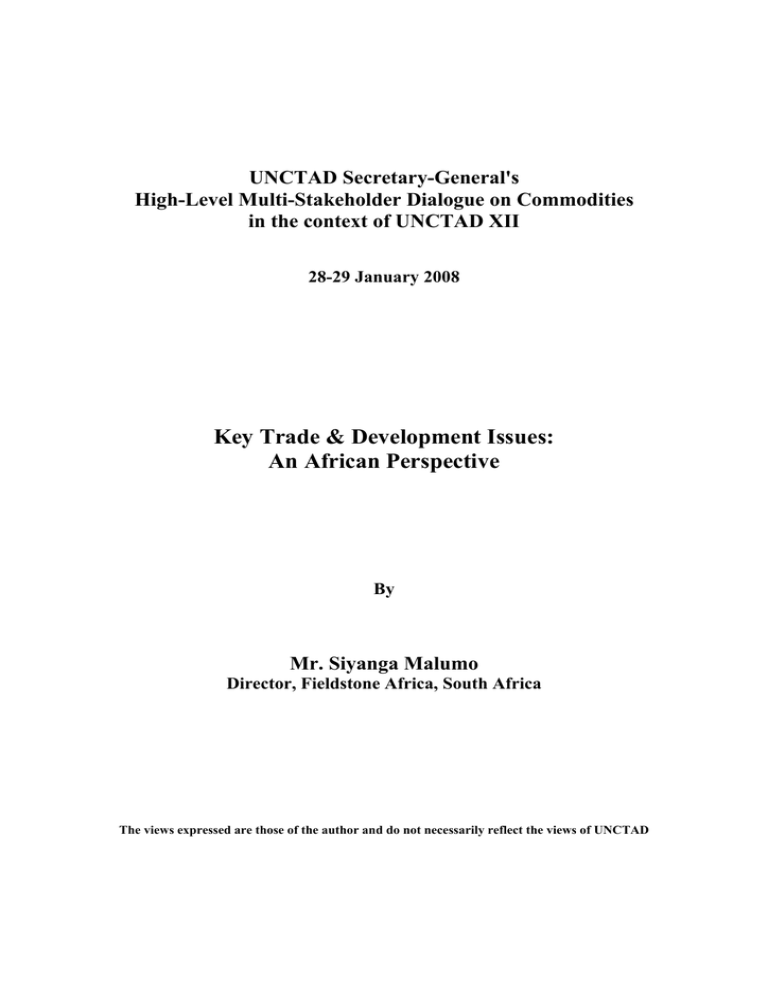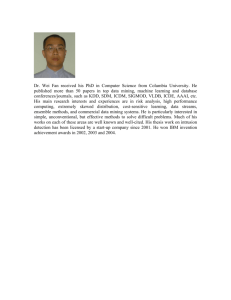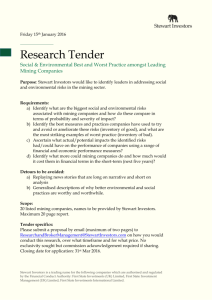UNCTAD Secretary-General's High-Level Multi-Stakeholder Dialogue on Commodities
advertisement

UNCTAD Secretary-General's High-Level Multi-Stakeholder Dialogue on Commodities in the context of UNCTAD XII 28-29 January 2008 Key Trade & Development Issues: An African Perspective By Mr. Siyanga Malumo Director, Fieldstone Africa, South Africa The views expressed are those of the author and do not necessarily reflect the views of UNCTAD HIGH LEVEL MULTI-STAKEHOLDERS DIALOGUE ON COMMODITIES: Key Trade & Development Issues: An African Perspective Presented by: Siyanga Malumo Director, Fieldstone Africa PALAIS DES NATIONS, GENEVA 28-29 JANUARY 2008 AFRICA’S DILEMMA “Given A Choice I Would Prefer to Keep Our Copper Underground for Another Century, Than to Give It Away for Nothing, As We are Doing Now.” “If This Man Called Mineral Boom Really Exists, How Come He Does Not Want Us To See Him Here Where The Mines Are?” “People Don’t Eat Statistics! We Are Told The Economy Is Growing, But Our Eyes Only See Misery All Around!” 2 HISTORICAL PERSPECTIVE: • Pre-colonial Period: Basic Mining – – – – Low Technology Limited Market Objectives Predominantly Local consumption Barter Trade • Colonial Period: -Adventurer Exploration – – – – – Industrial Exploration/Production “Mother Country” Markets Other Markets Social Responsibility Racism 3 HISTORICAL PERSPECTIVE: • Post Colonial (Independence) Period : – – – – – Nationalisations Development-Orientation Low Investment Capacity Low prices Decline in Production 4 THE PRESENT • Ownership: – – – – – Mostly Privatised Exit of Mining Giants Preponderance of Secondary Players Onerous Agreements (in Favour of Investors) Unstable Ownership (Frequent Dilution of Ownerships) • Investment /Finance Strategy: – – – – – – Highly Geared (Symbolic Equity, More Debt) Procure Mines/Concessions Cheaply High Write-offs (To Reduce Tax) Long Tax Holidays Maximum Income Externalisation Minimum Income Flow to Host Country 5 THE PRESENT • Operation Strategy: – Outsource (More than 80% of Key Activities) – Establishment of Private (Individual) Companies by Shareholders/Managers (To Win Outsourced Contracts) – Highly Mechanised – Low Local Employment – Low Local Content 6 THE PRESENT • Marketing Strategy: – Maximum Pricing – Extra-Africa Trade Direction – Non-Traditional Customers (China, India, Far East Focus) • Social Responsibility: – Avoid (or Barest Minimum) Responsibility – Oblivious to Local Infrastructure Deterioration – Blind Eye to Poverty in Vicinity 7 THE CHALLENGES • • • • Overdependence on Mining (One or Two Commodities) Lack of Economic Diversification Vagaries of International Commodity Prices Deteriorating Terms of Trade (Impact of Oil Imports Versus Revenue from Mineral Exports) • Desperation for Investment Versus Maximisation of National Revenue (for Development) • Tax Structure Sophistication of Investors Versus Ill-Equipped Local Official/Negotiators • Internationally Accepted Tax Write-offs Versus Need for Equitable Distribution of Mining Revenues 8 THE CHALLENGES • Weakness or Absence of Mining Laws (to Guide Investment, Operations, Safety, Social & Environmental Responsibility) • Lack of Proper/Effective Planning (e.g. Power Crisis in Eastern/Southern Africa) • Impatience of Citizens (Especially in Mining Areas) • How To Ensure The Benefits from Mining Are Share By All Citizens • The Scourge of Corruption • The Curse of Democracy • The HIV/AIDS Pandemic • Climate change (e.g. Current Rains in Southern Africa) 9 THE SOLUTIONS: DEVELOPMENT • Equitable Burden (Development) Sharing: – Mining To Make Discernible Contribution to Development – Renegotiate Mining Development Agreements – Mining Companies to Pay “Decent” & “Reasonable” Taxes & Royalties • Improve Terms of Trade: – Continue Diversifying Export Destination (Balance Between Traditional And “New Customers” (South-South) – Avoid Signing Contracts (Normal/Forward) Without First Establishing Tangible Benefits to the National Economy – Diversify National Energy Mix – Institute National Energy Saving Policies 10 THE SOLUTIONS: DEVELOPMENT • Economic Diversification: – Refine (or Introduce if Non-existent) National Economic Diversification Strategy – Demonstrate Discernible Benefits to The Economy, Public & Private Sectors – Define & Effect Clear Road Map (With Milestone) for Implementation – Put Resources into the Programme – Need for Value Addition Strategy • Policies: – Refine (or Introduce if Non-existent) Clear Mining Policies (Covering Investment, Operations, Safety, Social & Environmental Aspects) – Institute Policy Implementation Mechanism – Ensure Incentives (for Successful Implementation) and Penalties (for Failure) – Ensure Policy Buy-in, Nation & Sector-Wide – Give Legal Teeth to Policy Implantation Mechanism – Prioritise Local Content (in Terms of Investment, Technology, Partnerships & Access to Finance) 11 THE SOLUTIONS: CORPORATE • Ownership: – Public Private Partnerships – Need to Include local Investors • Investment/Finance: – – – – • Government (As PPP Investor) To Have Say In Financing Structures Insist on Least Cost Funding Structures Agree on Win-Win Approach to Taxation & Royalties (Principles of Equity) Need for Share Flotation on Local/Regional Stock Exchanges Operations: – Need Local Content – Need for Local Employment – Need for Training of Nationals • Social Responsibility: – Mining Companies to Commit to Minimum Social Responsibility (Schools, Hospitals, Vocational Training Programmes) – Mining Companies to Commit to Strict Environment Rules 12 THE END LA FIN FIM ASANTE SANA 13





